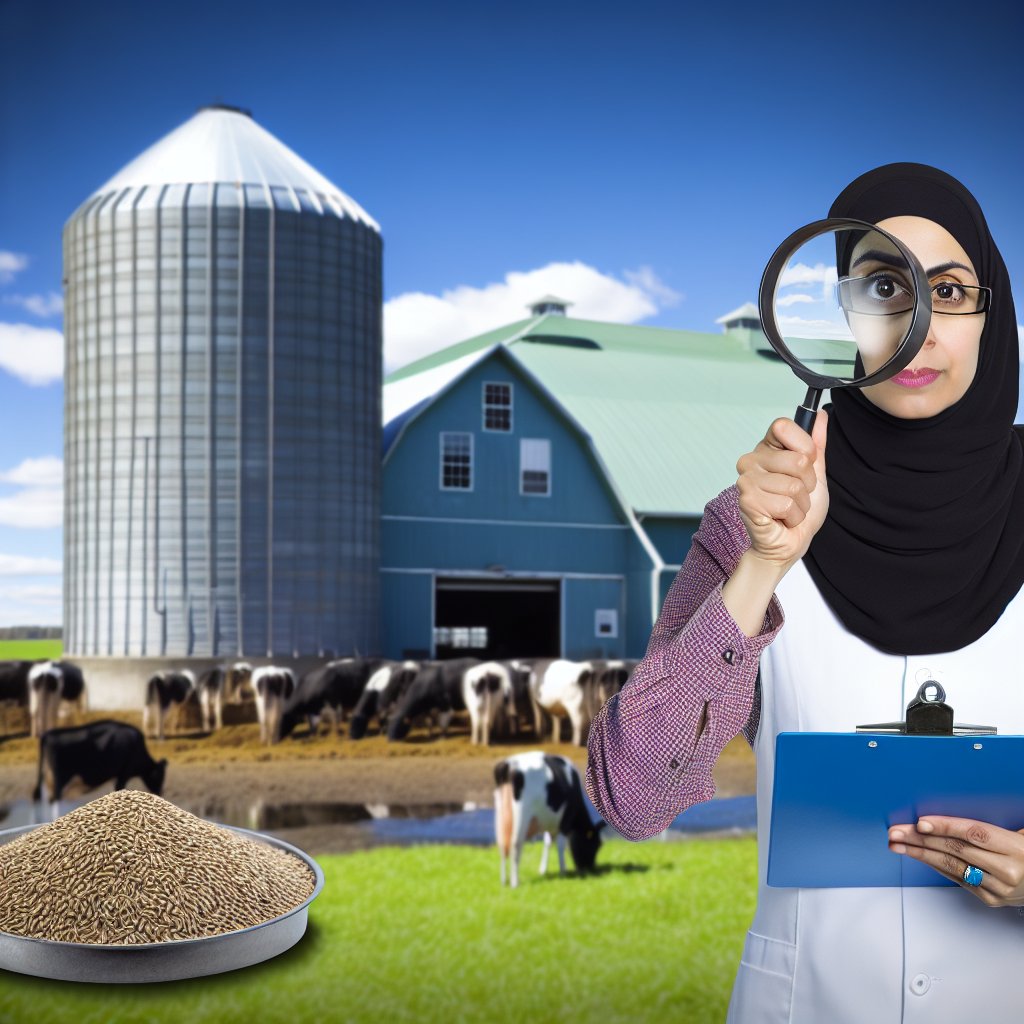Understanding the Role of a Livestock Nutritionist in Modern Agriculture
Defining the Livestock Nutritionist
A livestock nutritionist specializes in animal feed and nutrition.
They assess the dietary needs of various livestock types.
This role is crucial in improving animal health and production.
Moreover, they contribute to sustainable farming practices.
Importance of Balanced Nutrition
Balanced nutrition enhances livestock growth rates.
It also improves reproductive performance among animals.
Furthermore, it reduces the risk of diseases and health issues.
As a result, farmers can achieve higher productivity levels.
Formulating Diets for Livestock
Nutritionists analyze the specific nutritional requirements of animals.
They develop customized feed formulations based on these needs.
Common considerations include species, age, and production stage.
This tailoring ensures optimal performance and efficiency.
Utilizing Feed Additives
Feed additives improve the nutritional value of livestock diets.
Nutritionists evaluate various additives for their benefits.
These can include vitamins, minerals, and probiotics.
Appropriate use of additives ensures better health and productivity.
Cost Management and Profit Maximization
A livestock nutritionist helps optimize feed costs.
They recommend strategies to reduce waste and improve efficiency.
This, in turn, leads to increased profit margins for farmers.
Ultimately, smart nutrition management supports farm profitability.
Collaboration with Farmers
Nutritionists work closely with farmers to implement feeding programs.
They provide guidance on feeding practices and management.
Moreover, they educate farmers on the impact of nutrition on production.
Through effective communication, they ensure better outcomes.
Adapting to Industry Changes
The agriculture industry faces constant changes in regulations and practices.
Unlock Your Career Potential
Visualize a clear path to success with our tailored Career Consulting service. Personalized insights in just 1-3 days.
Get StartedNutritionists stay informed about the latest research and innovations.
They adapt feeding strategies to meet modern requirements.
This adaptability enhances the overall sustainability of livestock farming.
The Importance of Nutritional Management for Livestock Health and Productivity
Understanding Nutritional Requirements
Each livestock species has specific nutritional needs.
Understanding these needs enhances growth and productivity.
A livestock nutritionist assesses these requirements accurately.
They consider factors such as age, weight, and breed.
By tailoring diets, they ensure optimal health in livestock.
The Role of Nutrition in Health
Proper nutrition directly affects livestock health.
Balanced diets strengthen immune systems in animals.
A strong immune system reduces disease susceptibility.
Furthermore, good nutrition improves recovery from illnesses.
Healthy animals contribute to overall farm productivity.
Impact on Productivity
Nutritional management leads to increased productivity.
Well-fed livestock exhibit better growth rates.
They also produce higher quality meat, milk, or eggs.
Additionally, optimal feeding strategies enhance reproductive performance.
This results in a higher return on investment for farmers.
Cost-Effectiveness of Nutritional Management
Effective nutritional management is cost-effective for farms.
By preventing health issues, farms save on veterinary costs.
Improved growth rates lead to faster product turnover.
This maximizes profits and enhances cash flow.
Ultimately, a solid nutritional plan increases farm sustainability.
Analyzing Feed Ingredients and Their Impact on Livestock Performance
Importance of Quality Feed Ingredients
Quality feed ingredients are essential for healthy livestock growth.
They directly influence animal performance and overall farm profitability.
Moreover, high-quality feeds ensure better nutrient absorption.
This results in healthier animals and improved production metrics.
Understanding Nutritional Requirements
Each livestock species has specific nutritional needs.
Meeting these requirements enhances growth rates and reproductive success.
For instance, cattle need a balanced ratio of protein and energy.
Similarly, pigs require specific vitamins for optimal health.
Evaluating Feed Components
Different feed components vary in nutritional value.
Protein sources include soybean meal and canola meal.
Energy sources include corn and barley.
Additionally, fiber sources like alfalfa hay promote digestive health.
Maximizing Feed Efficiency
Feed efficiency measures how well animals convert feed into body weight.
Improved feed efficiency reduces feed costs and enhances profits.
Choosing the right ingredients significantly affects feed efficiency.
Farmers should regularly analyze feed formulation for optimal results.
Impact of Feed Additives
Feed additives can enhance livestock performance and health.
Common additives include probiotics and enzymes.
These additives improve digestion and boost immunity.
Consequently, they lead to reduced veterinary costs and sick days.
Monitoring and Assessing Performance
Regular monitoring of livestock performance is crucial.
This includes tracking weight gain, milk production, and feed intake.
Farmers should analyze performance data to identify trends.
Adjustments to feed strategies can then be made based on findings.
Collaboration with a Nutritionist
Working with a livestock nutritionist can benefit farm operations.
Nutritionists provide insights into optimal feeding strategies.
They also help in formulating balanced rations tailored to specific needs.
This collaboration can enhance overall farm profitability.
You Might Also Like: Soil Science Degrees and Certifications in Canada
Strategies for Formulating Cost-effective and Balanced Rations
Assessing Nutritional Requirements
An accurate assessment of livestock nutritional needs is crucial.
Start by evaluating the species and production goals of your animals.
Consider factors such as age, weight, and production stage.
Furthermore, gather information on environmental conditions.
Lastly, review any health issues that may affect their feed intake.
Choosing Quality Feed Ingredients
Selecting high-quality feed ingredients boosts ration effectiveness.
Local feed prices often vary, impacting cost-effective choices.
Develop relationships with reputable suppliers to ensure quality.
Evaluate feedstuffs like grains, forages, and protein meals.
Utilizing homegrown feeds can also reduce costs.
Incorporating Nutritional Supplements
Nutritional supplements enhance the overall diet balance.
Include vitamins, minerals, and energy sources in your rations.
Tailored supplements address specific deficiencies in your feeding program.
Always monitor the animals’ responses to these changes.
Adjust supplements based on performance data regularly.
Utilizing Technology for Ration Management
Technology plays an essential role in modern livestock nutrition.
Use software programs to formulate and manage rations efficiently.
Such tools help in tracking feed inventory and costs.
Regular updates streamline the decision-making process.
Moreover, consider using data analytics to optimize nutrition.
Regularly Evaluating Ration Efficiency
Frequent evaluations help maintain ration effectiveness.
Track growth rates, feed conversion ratios, and health indicators.
Conduct monthly assessments to identify improvement areas.
Engage a livestock nutritionist for professional insights.
This ongoing evaluation ensures profitability and sustainability.
Gain More Insights: How Livestock Nutritionists Improve Animal Health
Evaluating the Economic Benefits of Tailored Nutrition Plans
Understanding Tailored Nutrition
Tailored nutrition plans specifically meet the dietary needs of livestock.
This customized approach enhances health and productivity.
Consequently, farmers can see improved performance in their herds.
Economic Impact on Farm Profits
Several studies show a direct correlation between nutrition and profitability.
When livestock receive balanced diets, feed efficiency increases.
Higher feed efficiency translates into lower feed costs per unit of output.
As a result, farmers can enjoy improved profit margins.
Reducing Health Issues
Tailored nutrition minimizes health problems among livestock.
Healthy animals experience fewer medical interventions.
Lower veterinary costs contribute to overall farm profitability.
Therefore, investing in nutrition pays off in the long run.
Enhancing Product Quality
Nutrition directly influences the quality of livestock products.
Quality products fetch higher market prices.
For example, high-quality meat and dairy products attract premium buyers.
This shift can significantly enhance farm revenue.
Informed Decision-Making
Farmers benefit from working with livestock nutritionists.
These professionals provide valuable insights into dietary needs.
Data-driven decisions lead to better nutrition strategies.
Consequently, producers can optimize their operations efficiently.
Continuous Improvement
Regular evaluations of nutrition plans promote ongoing improvement.
Adapting to changes in livestock needs is essential.
Moreover, these adaptations help maintain or boost productivity levels.
Tailored nutrition fosters a dynamic farming environment.
Explore Further: Starting a Career in Seed Technology in Canada
The Role of Technology and Software in Nutritional Planning
Enhancing Nutritional Accuracy
Modern technology offers tools for accurate nutrient analysis.
Software can analyze feed composition with precision.
This process eliminates guesswork in nutritional planning.
NutriTech Solutions is one example of an innovative software provider.
They enable farms to formulate diets based on specific livestock needs.
Therefore, nutritional accuracy improves, leading to better livestock performance.
Streamlining Data Management
Technology simplifies the management of nutritional data.
Cloud-based systems store information securely and accessibly.
This accessibility enhances communication among farm staff.
Furthermore, it allows for real-time updates on livestock health.
Farmers can quickly adjust feeding strategies when needed.
As a result, operational efficiency increases significantly.
Facilitating Feed Formulation
Feed formulation software assists in creating balanced diets.
These tools consider nutritional value, cost, and availability.
They help identify the most economical feed options.
Analyzing different ingredients leads to optimal livestock health.
For instance, FarmFeed Pro integrates advanced algorithms for this purpose.
Through software, farmers can maximize profitability while maintaining nutritional standards.
Monitoring Livestock Performance
Technology enables continuous monitoring of livestock health.
Smart sensors track feed intake and growth rates.
Data collected helps nutritionists make informed decisions.
This proactive approach addresses potential issues before they escalate.
Consequently, farms can sustain higher productivity levels.
Livestock Nutrition Insights provides insightful analytics for farmers.
Improving Decision-Making Processes
Access to real-time data enhances decision-making capabilities.
Nutritionists use software to generate detailed reports easily.
These reports guide strategic planning for feed procurement.
Additionally, they align nutritional strategies with market demands.
Hence, better decisions lead to improved farm profitability.
AgriWise Consulting offers solutions focused on evidence-based guidance.
See Related Content: Understanding Seed Germination and Viability Testing

Implementing Sustainable Practices in Livestock Nutrition for Long-term Profitability
Understanding Sustainable Livestock Nutrition
Sustainable livestock nutrition focuses on balancing productivity and environmental responsibility.
This approach promotes the health of animals while minimizing waste.
Additionally, it seeks to use local feed resources effectively.
Farmers can optimize livestock diets to improve animal performance and reduce feed costs.
Benefits of Sustainable Practices
Implementing sustainable practices leads to increased farm profitability.
Firstly, it reduces feed expenses through improved efficiency.
Secondly, healthier animals typically mean less veterinary cost.
Moreover, sustainability enhances farm reputation in the market.
This can create opportunities for premium pricing on products.
Strategies for Effective Livestock Nutrition
Integrating nutrient management is pivotal for livestock health.
Using precision feeding techniques helps in meeting specific nutritional needs.
This approach ensures that animals receive the right nutrients at the right time.
Moreover, diversifying feed ingredients can improve the sustainability of the diet.
For instance, incorporating by-products can lower feed costs and waste.
Monitoring and Evaluation
Regularly assessing the nutritional program is essential for success.
Enterprises should track animal performance metrics closely.
Monitoring helps identify areas for improvement in feeding strategies.
Furthermore, using data analytics can enhance decision-making processes.
Effective evaluation enables farmers to adapt and refine their practices over time.
Collaboration and Knowledge Sharing
Collaboration with livestock nutritionists provides valuable insights.
Consulting experts can help farmers devise effective nutrition plans.
Additionally, attending workshops and seminars can enhance knowledge.
Sharing successful practices among farmers can foster community improvement.
Building a network facilitates information exchange on innovative methods.
Case Studies: Successful Nutrition Programs and Their Financial Outcomes
The Impact of Tailored Rations
A dairy farm in Wisconsin implemented a tailored nutrition program.
They focused on specific feed ratios and nutrient balances.
This approach improved milk production significantly.
As a result, their profits increased by 25 percent over two years.
Livestock Feed Efficiency Improvements
A beef cattle operation in Texas optimized feed efficiency.
By analyzing growth rates and feed intake, they refined their diets.
Consequently, their cost of gain reduced by 15 percent.
Overall, this led to a notable increase in overall profitability.
Swine Nutrition Management
A swine farm in Iowa adopted advanced nutrition management strategies.
They utilized precision feeding technologies for better outcomes.
This decision reduced feed waste significantly.
In turn, their profit margins expanded by 20 percent within one year.
Integrating Forage Quality
A sheep farm in Oregon improved forage quality through targeted practices.
They focused on the selection of high-quality pasture species.
This change increased lamb weight gain by 30 percent.
Consequently, the farm saw improvements in their market prices.
Measuring Success through Data Analytics
A poultry farm in Georgia implemented data analytics into their nutrition strategy.
This program tracked feed conversion ratios and bird health metrics.
Over time, they achieved significant reductions in feed costs.
The financial benefits from this approach added up to substantial savings.
Community Collaboration for Better Nutrition
A cooperative in Nebraska established a successful community nutrition program.
They combined resources to share best practices among local farmers.
This collaboration led to shared improvements in livestock profitability.
As a result, participating farms reported a 15 percent increase in net income.
Collaboration with Farmers: Best Practices for Implementing Nutrition Strategies
Building Strong Relationships
Effective collaboration begins with understanding farmers’ needs.
Regular communication fosters trust and transparency.
Farmers appreciate when nutritionists listen to their concerns.
Establish personal connections to enhance collaboration.
Assessing Nutritional Requirements
Conduct thorough assessments of livestock nutritional needs.
Each farm presents unique challenges and opportunities.
Work closely with farmers to evaluate their specific goals.
Utilize data-driven approaches to recommend nutritional strategies.
Regular Monitoring and Adjustments
Implement regular monitoring of livestock performance.
Track health metrics and growth rates consistently.
Adjust nutrition plans based on observed outcomes.
Farmers benefit from real-time feedback and adjustments.
Providing Education and Resources
Offer workshops to educate farmers about nutrition strategies.
Provide resources like feeding guidelines and best practices.
Encourage farmers to share experiences and successes.
Utilizing online platforms can enhance accessibility to resources.
Utilizing Technology
Embrace technology to streamline nutrition management.
Use software to analyze feeding programs and performance data.
Offer mobile apps that assist farmers in making informed decisions.
Educate farmers about the benefits of technology in their operations.
Additional Resources
Why Is Agriculture Important? Benefits and Its Role | Maryville Online




